This article was originally published on Technologizer.
Thirteen ways an Apple competitor might answer a really difficult question.
It’s been fifteen months since the first iPad shipped. Nearly every sizable company that makes anything that looks even sort of like a computer or a phone has rushed into the market that Apple created. Many of these companies haven’t yet shipped the tablets they’ve announced. Still, a critical mass of major iPad alternatives are now here–tablets such as Motorola’s Xoom, RIM’s PlayBook, and Samsung’s Galaxy Tab 10.1.
And yet no Apple competitor has started selling anything that clearly answers a fundamental question: “Why should somebody buy this instead of an iPad?” Sure, it’s easy to point at specific things that other devices do better (or at least differently) than the iPad, and some of the people reading this article can explain why they chose another tablet and don’t regret the move. (If you’re one of them, please do!) Still, sales figures for tablets show that when consumers compare the iPad to other choices, an overwhelming percentage conclude that the iPad is the best option.
As a reviewer of gizmos, I think that the iPad 2 is easily the best tablet on the market–and that most of the competition so far is too half-baked to be credible. As a lover of competition, though, I’m itching to see other tablets arrive that deserve to do well, too. So that question–”Why would somebody buy this instead of an iPad?”–is stuck in my head. I’ve been trying to figure out how an Apple rival can come up with a tablet that pretty much answers that question for itself. And I’ve come up with thirteen ways it could happen.
Most of these answers aren’t going to lure massive numbers of people away from the iPad all by themselves; it’s pretty clear that it’s unlikely that any one tablet will offer any one thing that lets it grab massive market share from Apple in the immediate future. But if you could ask a tablet why anyone should buy it instead of an iPad, here are the kinds of responses* that would make a difference.
*(Yes, for the purpose of this exercise, tablets can speak.)
 |
1. “I have more and/or better apps.”
The single best thing about the iPad is the amazing quantity and quality of the third-party applications available for it–software that was designed with it in mind and which often isn’t available for other tablets at all. Any manufacturer that had a tablet with more nifty apps than the iPad would have no trouble making the case for it as a viable alternative.
Any examples of other tablets that offer this? No. Not hardly. Nowhere near. And how long would it take for any competitive platform to get there? The real question isn’t when someone will surpass Apple; it’s when someone will have a selection of well-done tablet-optimized software that deserves any description other than “skimpy.”
2. “I have noticeably better hardware.”
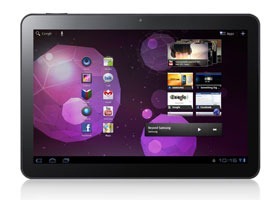 There are people who will buy a tablet because it has the fastest-possible dual-core processor, or the largest amount of RAM, or the camera with the highest megapixel count. If that makes them happy, fine. It’s clear, however, that with tablets–even more than PCs–impressive numbers don’t translate directly into the most impressive user experience. But that doesn’t mean that there’s no opportunity for an Apple rival to build a tablet with hardware that’s unquestionably better in ways that matter–something that’s much faster, for instance, or far lighter, or way better in terms of battery life.
There are people who will buy a tablet because it has the fastest-possible dual-core processor, or the largest amount of RAM, or the camera with the highest megapixel count. If that makes them happy, fine. It’s clear, however, that with tablets–even more than PCs–impressive numbers don’t translate directly into the most impressive user experience. But that doesn’t mean that there’s no opportunity for an Apple rival to build a tablet with hardware that’s unquestionably better in ways that matter–something that’s much faster, for instance, or far lighter, or way better in terms of battery life.
Any examples? Not decisively so. Some will argue that Samsung’s Galaxy Tab 10.1 is there, but Seth Weintraub’s cogent explanation of that tablet’s virtues uses words like “marginally” and “silly” when discussing the Tab’s edge on the iPad 2. I’m still looking for a tablet that blows the iPad away hardwarewise.
  |
3. “I have hardware with features Apple doesn’t have.”
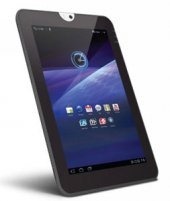 The iPad doesn’t have 4G connectivity. Or an SD slot. Or a standard USB connector. Or built-in HDMI. Or a removable battery. These are all things which reasonable people might covet in a tablet, and while I can’t imagine many folks would opt for another tablet over the iPad to get oneadditional feature, they might be intrigued by a tablet with a critical mass of them.
The iPad doesn’t have 4G connectivity. Or an SD slot. Or a standard USB connector. Or built-in HDMI. Or a removable battery. These are all things which reasonable people might covet in a tablet, and while I can’t imagine many folks would opt for another tablet over the iPad to get oneadditional feature, they might be intrigued by a tablet with a critical mass of them.
Any examples? Toshiba’s Thrive, arriving next month, has the SD slot, USB port, HDMI, and removable battery–as befits a Toshiba, it’s the most PC-like Android tablet I’ve seen to date, and among the iPad alternatives with the clearest identity of its own.
4. “I come in a noticeably different size.”
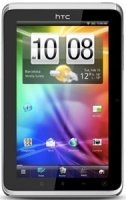 Steve Jobs may think that 7″ tablets make no sense. A recent survey says that less than fifteen percent of people want one. Still, I’ve run into more than a handful of folks who think it’s a much more pleasing form factor than the iPad and its competitors with screens in the neighborhood of 10 inches. And considering screen size to be a major factor when picking a tablet makes perfect sense, as long as you can find a well-rounded tablet at the size you prefer. (I may be alone on this, but I’m also fascinated by the notion of tablets with much larger screens than the iPad.)
Steve Jobs may think that 7″ tablets make no sense. A recent survey says that less than fifteen percent of people want one. Still, I’ve run into more than a handful of folks who think it’s a much more pleasing form factor than the iPad and its competitors with screens in the neighborhood of 10 inches. And considering screen size to be a major factor when picking a tablet makes perfect sense, as long as you can find a well-rounded tablet at the size you prefer. (I may be alone on this, but I’m also fascinated by the notion of tablets with much larger screens than the iPad.)
Any examples? I haven’t seen a 7″ tablet that’s knocked my socks off–the PlayBook is a big disappointment, and Android 7-inchers such as HTC’s Flyer aren’t using the tablet-friendly Gingerbread yet. But I don’t see any basic obstacles that will prevent someone, someday from building a really nice, up-to-the-minute 7″ Android tablet.
  |
5. “I have noticeably different software.”
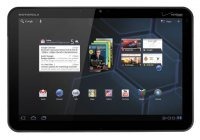 Notice that I’m not listing “noticeably better software” as an option here. It’s possible that a tablet will come along at some point with software that’s clearly a great leap forward beyond iOS, in the same way that the iPhone software was clearly a major advance beyond the Palm OS and its rivals. But if anyone’s working on that software right now, they’re managing to keep it a deep secret.
Notice that I’m not listing “noticeably better software” as an option here. It’s possible that a tablet will come along at some point with software that’s clearly a great leap forward beyond iOS, in the same way that the iPhone software was clearly a major advance beyond the Palm OS and its rivals. But if anyone’s working on that software right now, they’re managing to keep it a deep secret.
For now, software is subjective, and anyone shopping for a tablet is entitled to prefer one operating system over another based on subtle matters of personal preference. I think Google’s Android 3.1 Honeycomb is quite impressive, and it’s got its own personality; some people are going to enjoy using it more than iOS. I’m also hopeful about HP’s Web OS as seen on the TouchPad. (RIM’s PlayBook tablet OS , on the other hand, needs lots and lots of work to get in the game.)
Any examples? The still-small number of shipping tablets that run Honeycomb offer an experience that’s both different from the iPad 2 and enjoyable.
6. “I have better entertainment services.”
Apple’s iTunes Store is still the planet’s most comprehensive purveyor of digital entertainment, with music, movies, and TV shows that play on the iPad, the iPhone, the iPod Touch, Macs, and PCs, and which can be synced and shuttled from gizmo to gizmo in a variety of ways. If you don’t like iTunes, you can use Netflix or Hulu Plus or Rhapsody or Napster or Rdio or MOG or MLB At Bat or the ABC app or any of numerous other apps.
Any examples? Nope, and Google is just getting its music and movie services off the ground. Along with third-party apps, this is one of the most daunting leads Apple has on the competition. Maybe it’ll be a third party (coughcoughAmazon) who cuts into Apple’s gigantic lead, not a platform provider or hardware maker.
  |
7. ”I cater to a different market.”
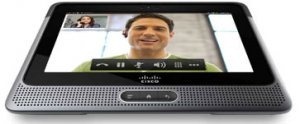 When it comes to building computing devices that consumers covet, Apple has no peers. But consumers aren’t the only prospective tablet buyers. If a tablet maker set out to please a different target market–businesspeople, or a subset of businesspeople–it could focus on things other than Apple’s core competencies. That wouldn’t be easy, but it sounds less scary than trying to out-Apple Apple.
When it comes to building computing devices that consumers covet, Apple has no peers. But consumers aren’t the only prospective tablet buyers. If a tablet maker set out to please a different target market–businesspeople, or a subset of businesspeople–it could focus on things other than Apple’s core competencies. That wouldn’t be easy, but it sounds less scary than trying to out-Apple Apple.
Any examples? RIM would tell you that the “professional-grade” PlayBook is a better tablet for corporate use than the iPad. But (A) in its initial form, it’s so profoundly rough that it doesn’t feel professional at all; and (B) RIM was too undisciplined to truly focus on business use. (The PlayBook comes bundled with games and is being touted on TV as a great entertainment device.)
Perhaps Cisco’s Cius has a shot at being the definitive business tablet. Or perhaps not: it’s made almost no news since it was announced a year ago. Actually, it’s entirely possible that the iPad will be the leading business tablet for years to come, even if that’s a secondary use for it rather than its primary purpose.
  |
8. “My openness and/or flexibility actually pay off.”
The iPad has the best-designed software in the business, but it didn’t get there by providing immense flexibility. Actually, there are shockingly few areas of the software that permit you to fool around with settings to choose a different way of doing things. (One scrawny example: the slider on the side that can be either a mute switch or an orientation lock.) And we all know that the App Store is run the way Apple thinks the App Store should be run, which sometimes means that entire categories of software that some of us would like to get our hands on are verboten. So on paper, at least, a less controlling experience should be an easy route to tablet success.
Any examples? Android is supposed to be that flexible, open mobile operating system, right? We can debate this subject non-stop for the next few months if you’d like–and probably will–but I’ve been continuously disappointed by the degree to which its openness doesn’t translate into enormous benefits to be had as a user of mobile devices. There aren’t enough utilities for tweaking its interface, and there are too few knockout apps in the Android Market which Apple would never approve. I’m still looking for a tablet OS that feels like it provides anything like the degree of freedom I have on a Windows PC or a Mac. (Come to think of it, today’s most customizable mobile operating system may be jailbroken iOS.)
  |
9. “I feature a popular software platform that Apple isn’t going to support–and I do it well.”
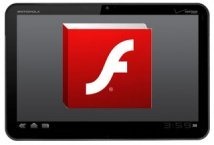 I’d rather be forced to smack myself repeatedly in the noggin with a hammer than to be dragged back into the Apple/Adobe Flash maelstrom. But there are people who take their Flash so seriously that they won’t buy a tablet that doesn’t support it. Me, I think they should hold out for a tablet that supports Flash really well–which wouldn’t describe any of the ones I’ve tried so far. (As McCracken’s Third Paradox of the Tablet Market states, by refusing to support Flash and forcing companies to come up with alternative plans, Apple has made the iPad a better platform for Flash-type activities–video and games–than those platforms that do support Flash.)
I’d rather be forced to smack myself repeatedly in the noggin with a hammer than to be dragged back into the Apple/Adobe Flash maelstrom. But there are people who take their Flash so seriously that they won’t buy a tablet that doesn’t support it. Me, I think they should hold out for a tablet that supports Flash really well–which wouldn’t describe any of the ones I’ve tried so far. (As McCracken’s Third Paradox of the Tablet Market states, by refusing to support Flash and forcing companies to come up with alternative plans, Apple has made the iPad a better platform for Flash-type activities–video and games–than those platforms that do support Flash.)
We also keep hearing that there are big corporations who don’t want to buy iPads because they crave the compatibility and familiarity of Windows-based tablets. But it seems like most of those companies are wisely waiting to see how Windows 8 pans out rather than buying Windows 7 tablets.
Any examples? Any tablet that supports Flash. Which is pretty much all of them except the iPad. And Windows tablets aimed at specialized business uses, such as ones from Fujitsu and Motion Computing. I reiterate though: if you love Flash and/or Windows so much that you refuse to buy an iPad, the wisest strategy isn’t to buy a different tablet. It’s waiting until Flash and Windows get more mobile-friendly.
  |
10. “I’m meaningfully cheaper.”
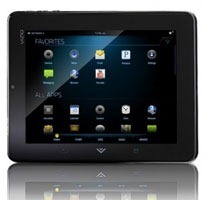 Remember when Apple’s then-unannounced tablet was supposed to sell for something like $1000, giving the rest of the industry lots of opportunity to steal its market share by undercutting its price? Instead, the iPad started at $499, a price that other manufacturers have struggled to match, let alone beat. But with tablets, as all things, price is a major issue for plenty of prospective buyers. And one way for an iPad alternative to quickly make its mark would be if it was (A) decent; and (B) substantially cheaper.
Remember when Apple’s then-unannounced tablet was supposed to sell for something like $1000, giving the rest of the industry lots of opportunity to steal its market share by undercutting its price? Instead, the iPad started at $499, a price that other manufacturers have struggled to match, let alone beat. But with tablets, as all things, price is a major issue for plenty of prospective buyers. And one way for an iPad alternative to quickly make its mark would be if it was (A) decent; and (B) substantially cheaper.
Any examples? Well, Toshiba’s Thrive will start at $429, but that’s not thatmuch cheaper, and it’s for a model with 8GB–half of the iPad’s starting capacity. If Vizio’s upcoming tablet goes for $349 at Wal-Mart, it’ll be a better test of the lure of a lowball price.
  |
11. “I have a wild card.”
If a tablet is plain different from the iPad in ways that aren’t otherwise accounted for on this list, it might appeal to at least certain buyers.
Any examples? How about Barnes & Noble’s Nook Color? Setting aside the fact that it goes for half the price of the cheapest iPad, its emphasis on one function–reading– makes it unique among tablets with color screens and app stores.
If you can wait until mid-to-late 2012, all evidence suggests that there will be Windows 8 tablets that are capable of both behaving sort of like an iPad and running full-blown Windows apps. It’s too early to tell if they’ll be any good. But unless Apple comes up with something that’s both an iPad and a Mac in the interim, Microsoft will offer a stark choice, at least.
12. “I’m made by a company that isn’t Apple.”
This may come as an immense shock to you, but there are certain people who just don’t like Apple–for reasons that can be rational, emotional, or some combination thereof. I’m not a missionary, so I don’t have much interest in convincing such reverse fanboys to change their ways. They’ll be happier using a tablet they’re predisposed to like than one they’re predisposed to hate.
Any examples? Hey, any tablet not manufactured by Apple is by definition a non-Apple tablet, and therefore more appealing to Apple loathers than the iPad. We’re still be waiting for the definitive iPad alternative, but at the moment, Samsung’s Galaxy Tab 10.1 is the strongest contender. It’s certainly the currently-for-sale tablet I’d mention first to if someone asked me to recommend a tablet that wasn’t the iPad.
  |
13. “I have a magical combination of most or all of the above factors.”
What if there was a non-Apple tablet with an abundance of great tablet-optimized apps, top-notch movie and music services, hardware that was both super-sexy and powerful, a wonderfully intuitive and customizable operating system, and several unique features–and it started at $399? It might still find competing with the iPad to be remarkably challenging–but at least nobody would have trouble coming up with reasons why a rational person would buy it.
Any examples? No, not yet. None on the horizon, either. But never say never…
Got any other strategies for how non-Apple tablets can justify their own existence in a way that’s easy for large numbers of people to understand? I’m not asking for anyone to explain how a competitor will trounce the iPad: I don’t think that’s going to happen anytime soon. I’m just trying to figure out how one other product–or several, or lots of them–will offer something that everyone agrees is a worthy alternative and a solid success.
 |


